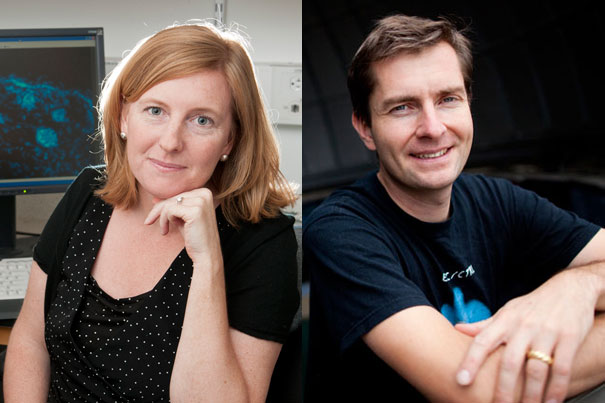
“David Charbonneau and Hopi Hoekstra are both prime examples of what makes Harvard, and the Faculty of Arts and Sciences [FAS], exceptional places for students,” said FAS Dean Michael D. Smith. Hoekstra (left) and Charbonneau are recipients of the inaugural Fannie Cox Prize for Excellence in Science Teaching.
Photos by (left) Rick Friedman; (right) by Stephanie Mitchell/Harvard Staff Photographer
Award-winning teaching
Hoekstra, Charbonneau receive inaugural prize for excellence in science teaching
Professor of Astronomy David Charbonneau and Professor of Organismic and Evolutionary Biology and Molecular and Cellular Biology Hopi Hoekstra have been named as the recipients of the inaugural Fannie Cox Prize for Excellence in Science Teaching.
Created to recognize outstanding teaching in introductory science courses, the prize was established through a gift from Gardner Hendrie ’54. Winners are nominated by a committee composed of faculty from across the sciences and selected by Dean of Science and Mallinckrodt Professor of Geophysics and Professor of Computational Science Jeremy Bloxham for their ability to inspire students, instill in them a passion for science, and effectively communicate complex ideas. Each winner receives a grant of $40,000 in unrestricted support for research and teaching, as well as a $10,000 personal award.
“I want to congratulate David and Hopi on receiving this award, and recognize their amazing work to instill a passion for scientific learning in our students,” Bloxham wrote in a letter to faculty announcing the prize. “It is my hope that this prize and the examples set by this year’s recipients will both promote excellence in teaching and demonstrate that great teaching and outstanding research can, and do, go hand in hand.”
“David Charbonneau and Hopi Hoekstra are both prime examples of what makes Harvard, and the Faculty of Arts and Sciences [FAS], exceptional places for students,” FAS Dean Michael D. Smith, the John H. Finley Jr. Professor of Engineering and Applied Sciences, said. “In addition to being world-class researchers, both display a passion for teaching that is infectious among their colleagues and inspiring for their students. I congratulate them for this well-deserved honor.”
In his announcement to faculty, Bloxham cited Charbonneau and Hoekstra’s consistently high ratings in the Q Guide (4.79 and 4.61, respectively, out of five). Charbonneau is also credited with increasing the number and diversity of astronomy concentrators, while the number of students in the introductory course in evolutionary biology co-taught by Hoekstra, who is also Alexander Agassiz Professor of Zoology, and Andrew Berry, lecturer on organismic and evolutionary biology, has gone from 34 in 2008 to 86 in 2011.
Both Charbonneau and Hoekstra said they hope the prize draws attention to the importance of undergraduate education, and offers validation for the dedicated work of all faculty members.
“The news of this prize came completely out of the blue, and was a huge lift,” Charbonneau said. “It is essential that we celebrate excellence in science teaching. The message that one sometimes hears is that research trumps teaching, but that doesn’t reflect the reality at Harvard in 2011. I find such joy in teaching and mentoring our undergraduates. The rejuvenation of our undergraduate curriculum in astrophysics is one of the things I am most proud of since I arrived as a professor seven years ago.”
Charbonneau’s plans for the research funds include an idea he has worked on for some time — launching a research project in science education, with a focus toward encouraging a broader participation in the physical sciences.
“I am truly humbled by this honor, and feel particularly lucky for two reasons,” Hoekstra said. “First, I teach a subject, evolutionary biology, about which I am truly passionate, so portraying an enthusiasm for the material comes naturally. Second, I co-teach the course with Andrew Berry, who is one of the most inspiring lecturers I have ever known; he has made me a better teacher, and we make a great team.
“Perhaps one of the most challenging parts of our jobs as faculty is trying to balance teaching and research,” she added. ���While there are many prizes for excellence in research, there are far fewer recognizing teaching and still fewer recognizing excellence in both teaching and research. Thus, this award is especially unique and important.”




